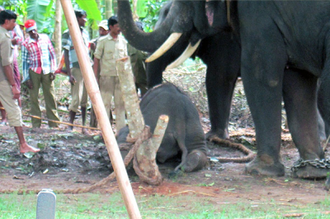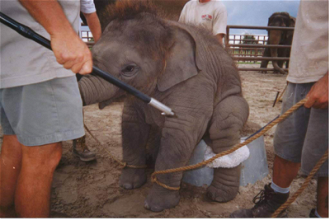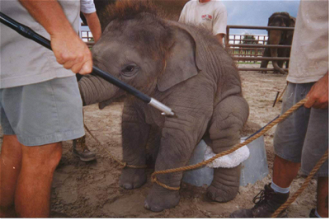Urgent call for law to protect Asian elephants - while there's still time

Baby elephant being 'disciplined" by beating in front of its parent (pajan)
In the 19th century there were more than a million Asian elephants. Now there are less than 40,000, many kept in very cruel conditions, brutalised and exploited for the tourist trade and for other uses.
A petition calling for a new law to protect Asian elephants by a UK ban on adverts for unethical venues, reached one million signatures this week - the largest petition ever for the species. The sponsors - the Save the Asian Elephant campaign led by Catholic lawyer Duncan MacNair are meeting DEFRA this week, and will be having their fifth meeting with the Prime Minister's officials at 10 Downing St on 9 February.
The plight of elephants in Africa is widely recognised, but far less is known of the even more desperate threats facing Asian elephants, whose surviving population is barely five per cent that of African elephants.
These magnificent, highly intelligent creatures are treated with terrible cruelty in India and across southeast Asia. Young elephants are snatched from their forest homes to supply tourist attractions, temples and festivals. Capture from the wild often entails slaughtering the mothers and other herd members who attempt to protect their young.
Little calves are then isolated, forced into a pen and tied with ropes to prevent them moving. They are deprived of water, food and sleep. Terrified, they are brutally, often fatally, beaten with rods, chains or bullhooks (a rod with sharp metal hooks at the striking end) and stabbed with knives and nails. This practice - 'pajan' - is designed to break their spirits and brutalise them into submission.
STAE is urging Indian Prime Minister Narendra Modi to end pajan and ensure the proper treatment of captive elephants - either by being released into the forests or kept in genuine sanctuaries. It is appealing to British Prime Minister Boris Johnson to urgently fulfil the Government's Manifesto commitment to "support the Indian Government in its efforts to protect the Asian elephant." And it is calling on the Association of British Travel Agents (ABTA) to press its members including Virgin Holidays, to remove elephant attractions from their itinerary in India and the rest of Asia. Only visits to genuine sanctuaries and wildlife reserves where tourists observe elephants at a respectful distance (and do not ride them) should be permitted.
Recently, new evidence has emerged on the risks of Covid spreading from elephants in close confinement. After a preliminary study, the biologist and medical scientist, Dr Clifford Warwick, stated last month: "In my view, there exist sufficient grounds to ascribe the precautionary principle to relevant risk of coronavirus transmission from elephants to humans via close contact experiences, and the simplest measure to avoid such risk to prevent close contact episodes. While I remain of the view, that tuberculosis constitutes the primary elephant-associated human disease risk, and that the commonly stressful management conditions for elephants increase risk factors, coronavirus and other potential pathogens also must be regarded as inherent important concerns associated with close contact elephant tourism."
The STAE's campaign for the new law has received strong endorsement from the RSPCA and other animal welfare organisations.
More than 80 faith leaders have expressed their support for the campaign.
Rt Rev John Arnold, Bishop of Salford, said: "As Lead on the Environment for the Catholic Bishops' Conference of England and Wales, I stand absolutely against the abusive commercial exploitation of Asian elephants. The species is highly sentient and susceptible to pain and feelings of fear, loss and grief in many ways akin to humans. Furthermore it is widely recognised as environmentally very important to the nourishment and sustenance of the forests it inhabits in the wild, themselves essential to the welfare of the planet. Furthermore Asian elephants can attack humans when provoked beyond their endurance and when their condition is compromised by abuse, they are highly effective transmitters of deadly airborne viruses. I strongly support attempts to gain legal protection for Asian elephants through a ban on promotion in the UK market of venues where abusive practices are happening to the elephants."
The Rt Rev Nick Holtam, Bishop of Salisbury, the Church of England's Lead Bishop for the Environment said: "Every animal is part of God's Creation and the animal kingdom is integral to His plan for our earthly world. As creatures of God, animals have intrinsic value beyond any utility they may provide humans. The de facto dominion we exert over them is no justification for cruelty. On the contrary it connotes a responsibility to safeguard and protect them. The mighty Asian elephant, with its intelligence, sense of family and capacity for feelings of affection, pain, grief and loss, is most brutally treated for commercial gain and now placed in immediate danger of extinction. I strongly support Save The Asian Elephants' attempts to gain protection by law from such exploitation for this wondrous species whilst there is still time."
To sign the petition see: www.change.org/p/help-us-save-the-asian-elephants-by-liking-and-sharing-this-post-savetheasianelephants
Read more about Save the Asian Elephant: www.stae.org


















